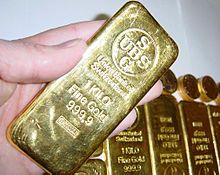Cross posted from The Stars Hollow Gazette
This is your morning Open Thread. Pour your favorite beverage and review the past and comment on the future.
Find the past “On This Day in History” here.
Click on image to enlarge
June 5 is the 156th day of the year (157th in leap years) in the Gregorian calendar. There are 209 days remaining until the end of the year

1933, the United States went off the gold standard, a monetary system in which currency is backed by gold, when Congress enacted a joint resolution nullifying the right of creditors to demand payment in gold. The United States had been on a gold standard since 1879, except for an embargo on gold exports during World War I, but bank failures during the Great Depression of the 1930s frightened the public into hoarding gold, making the policy untenable.
Soon after taking office in March 1933, Roosevelt declared a nationwide bank moratorium in order to prevent a run on the banks by consumers lacking confidence in the economy. He also forbade banks to pay out gold or to export it. According to Keynesian economic theory, one of the best ways to fight off an economic downturn is to inflate the money supply. And increasing the amount of gold held by the Federal Reserve would in turn increase its power to inflate the money supply. Facing similar pressures, Britain had dropped the gold standard in 1931, and Roosevelt had taken note.
Prolongation of the Great Depression
Some economic historians, such as American professor Barry Eichengreen, blame the gold standard of the 1920s for prolonging the Great Depression. Others including Federal Reserve Chairman Ben Bernanke and Nobel Prize winning economist Milton Friedman lay the blame at the feet of the Federal Reserve. The gold standard limited the flexibility of central banks’ monetary policy by limiting their ability to expand the money supply, and thus their ability to lower interest rates. In the US, the Federal Reserve was required by law to have 40% gold backing of its Federal Reserve demand notes, and thus, could not expand the money supply beyond what was allowed by the gold reserves held in their vaults.
In the early 1930s, the Federal Reserve defended the fixed price of dollars in respect to the gold standard by raising interest rates, trying to increase the demand for dollars. Its commitment and adherence to the gold standard explain why the U.S. did not engage in expansionary monetary policy. To compete in the international economy, the U.S. maintained high interest rates. This helped attract international investors who bought foreign assets with gold. Higher interest rates intensified the deflationary pressure on the dollar and reduced investment in U.S. banks. Commercial banks also converted Federal Reserve Notes to gold in 1931, reducing the Federal Reserve’s gold reserves, and forcing a corresponding reduction in the amount of Federal Reserve Notes in circulation. This speculative attack on the dollar created a panic in the U.S. banking system. Fearing imminent devaluation of the dollar, many foreign and domestic depositors withdrew funds from U.S. banks to convert them into gold or other assets.
The forced contraction of the money supply caused by people removing funds from the banking system during the bank panics resulted in deflation; and even as nominal interest rates dropped, inflation-adjusted real interest rates remained high, rewarding those that held onto money instead of spending it, causing a further slowdown in the economy. Recovery in the United States was slower than in Britain, in part due to Congressional reluctance to abandon the gold standard and float the U.S. currency as Britain had done.
Congress passed the Gold Reserve Act on 30 January 1934; the measure nationalized all gold by ordering the Federal Reserve banks to turn over their supply to the U.S. Treasury. In return the banks received gold certificates to be used as reserves against deposits and Federal Reserve notes. The act also authorized the president to devalue the gold dollar so that it would have no more than 60 percent of its existing weight. Under this authority the president, on 31 January 1934, fixed the value of the gold dollar at 59.06 cents.


